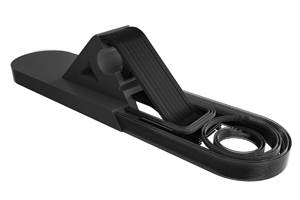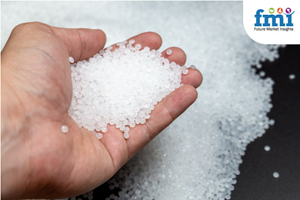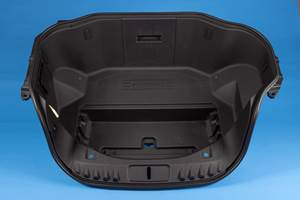Pioneering Generation of Stabilizers for High-Quality Polyolefin Recyclate
Fraunhofer LBF and Bruggemann cooperate on successfully tackling thermal and photo oxidation of plastics.
Specialty chemicals manufacturer Bruggemann (U.S. office in Newton Park, Penn.) and Germany’s Fraunhofer LBF Institute have joined forces to successfully tackle one of the seemingly insurmountable problems of plastics recycling. During their lifetime, plastic articles are subjected to thermal and photo oxidation, which can create enough damage to prevent them from being recycled into high-quality products.
Researchers at the Fraunhofer Institute for Structural Durability and System Reliability LBF, Darmstadt, have developed new stabilizer systems to improve the properties of polyolefin recyclates. These stabilizers reportedly are capable of reducing the effects of previous damage to such an extent that recycled materials become suitable for processing into sophisticated molded products. In its ongoing development, Fraunhofer LBF is collaborating closely with Bruggemann, a manufacturer of additives for engineering plastics. Bruggemann will also be responsible for production and worldwide distribution of the novel additives.
Fraunhofer researchers have used their extensive know-how on the effects of polymer additives such as antioxidants, light stabilizers, flame retardants and nucleating agents to tackle the special challenges posed by recycled materials. Due to their special reactivity, the new stabilizer systems have the potential to neutralize the effects of previous damage, paving the way for the production of recyclate with processing properties and long-term heat stability that are similar to those of virgin material.
Moreover, the new systems are based partially on renewable raw materials, additionally contributing to a reduced CO2 impact on the environment. Achieving this development target was accelerated with the support of the recently launched "Circular Plastics Economy" research cluster, consisting of five institutes of the Fraunhofer-Gesellschaft working with their stakeholders towards a functioning circular plastics industry.
"With its many years of comprehensive experience in the field of polymer additives and its worldwide market penetration, Bruggemann is the right partner to bring our ideas for the upcycling of plastics to market quickly,” Rudolf Pfaendner, head of the plastics division at Fraunhofer LBF, said. Building on the work of Fraunhofer LBF, Bruggemann will use its know-how and technical potential to optimize formulations. The company will adapt the stabilizers to the requirements of customers and markets, as well as provide technical application advice, large-scale production, quality assurance and worldwide marketing.
Bruggemann traditionally focuses on high-performance additives for nylons, including heat, processing and light stabilizers, process auxiliaries and modifiers. Marketed under the Bruggolen brand, these additives are said to ensure processing efficiency, extended component service life and high quality under economically favorable conditions, in both injection molding and extrusion. The company is currently going through a significant expansion and its new, highly automated facility will also produce the new additives for polyolefin recycling.
"Continuous development is an essential basis for our company's success,” Klaus Bergmann, Bruggemann’s head of polymer additives, said. “We are very pleased to have entered into a cooperation agreement with the Fraunhofer LBF to expand our portfolio of recycling additives to polyolefins. Ultimately, our goal is to significantly improve the quality of recyclates with the help of innovative additives, thereby making an important contribution to the upcycling of plastic waste.”
At K2019, Bruggemann had presented reactive chain modifiers for nylon recyclates that enable precise and robust adjustment of the molar masses and viscosities required for the respective applications. Even small amounts of additive and a single extrusion step are sufficient to produce recyclates, the properties of which are at the level of virgin materials.
Related Content
Additive Fusion Technology Optimizes Composite Structures for Demanding Applications
9T Labs continues to enhance the efficiency of its technology, which produces composite parts with intentionally oriented fibers.
Read MoreABC Technologies to Acquire Windsor Mold Group Technologies
The Tier One automotive supplier with compounding and blowmolding machine capabilities adds the 50-yr-old molder and moldmaker.
Read MorePlastic Compounding Market to Outpace Metal & Alloy Market Growth
Study shows the plastic compounding process is being used to boost electrical properties and UV resistance while custom compounding is increasingly being used to achieve high-performance in plastic-based goods.
Read MoreAutomotive Awards Highlight ‘Firsts,’ Emerging Technologies
Annual SPE event recognizes sustainability as a major theme.
Read MoreRead Next
Lead the Conversation, Change the Conversation
Coverage of single-use plastics can be both misleading and demoralizing. Here are 10 tips for changing the perception of the plastics industry at your company and in your community.
Read MoreMaking the Circular Economy a Reality
Driven by brand owner demands and new worldwide legislation, the entire supply chain is working toward the shift to circularity, with some evidence the circular economy has already begun.
Read More
























